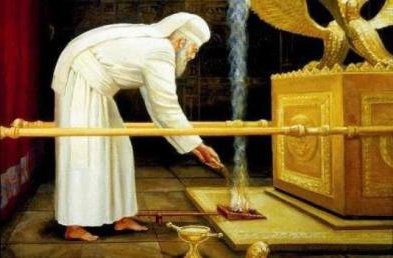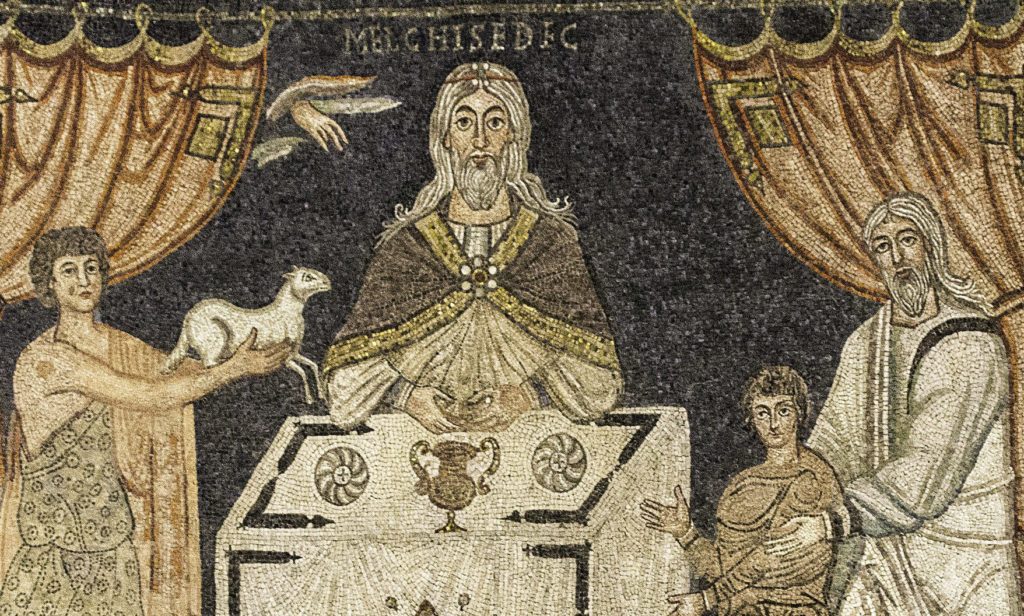וְהַכֹּהֵן֩ הַגָּדֹ֨ול מֵאֶחָ֜יו אֲֽשֶׁר־יוּצַ֥ק עַל־רֹאשֹׁ֣ו שֶׁ֤מֶן הַמִּשְׁחָה֙ וּמִלֵּ֣א אֶת־יָדֹ֔ו לִלְבֹּ֖שׁ אֶת־הַבְּגָדִ֑ים אֶת־רֹאשֹׁו֙ לֹ֣א יִפְרָ֔ע וּבְגָדָ֖יו לֹ֥א יִפְרֹֽם׃
“‘The high priest – who is greater than his brothers, on whose head the anointing oil is poured, who has been ordained to wear the priestly garments – must neither dishevel the hair of his head nor tear his garments.
Leviticus 21:10 WLC NET
The High Priest – a greater man
If you have been following this series on the book of Hebrews you may already be thinking, ‘he just talked about the high priest in Hebrews 3.’ It’s obviously an office of great importance, but what more can be said by the author of Hebrews?

In fact, even though we don’t necessarily revere an anointed priest above priests (or a bishop above bishops) as any more relevant to religion than any man, the LORD established an authority to come closer to Him on behalf of the congregation.
Therefore the writer continues to make a connection between the high priest and Christ not only here, but also later in Hebrews 7 and 8. The priest and high priest are more than just anointed offices of the Temple and church.
Hebrews 5 :
For every high priest taken from among men is appointed in matters pertaining to God for the people, to offer both gifts and sacrifices for sins.
Hebrews 5:1 CSB

We don’t really think of a priest in this way anymore, do we?
Yet if we are not able to stand before the Living God, who can?
And, in fact, if the Lord anoints a man to ‘offer both gifts and sacrifices’ for our sins, who should he be?
So why do we need a priest? The writer of Hebrews reminds us:
2 He is able to deal gently with those who are ignorant and are going astray, since he is also clothed with weakness.
Think of one of your many sins. Would you want someone who will deal with your punishment and correction gently? And do you hope this intercessor between you and Almighty God in his own weakness will have compassion for you?
Of course. And he continues:
3 Because of this, he must make an offering for his own sins as well as for the people.
Therefore any intercessor for our sins must also offer a personal sacrifice for his own sins. We cannot hide our sins from God. Perhaps the priest and high priest will be even more fearful coming before the judgement seat than you or me.
4 No one takes this honor on himself; instead, a person is called by God, just as Aaron was.
Scripture points to Christ as our High Priest
5 In the same way, Christ did not exalt himself to become a high priest, but God who said to him,
You are my Son;
Hebrews 5:5, Psalm 2
today I have become your Father,
The writer of Hebrews adds:
You are a priest forever
according to the order of Melchizedek.
He speaks not only of the high priest anointed for an appointed time, but of an order of priests before Levi, referring to Melchizedek to whom Abraham gave sacrifices to present to the LORD. (He will elaborate in later chapters.) The priests descended from Israel’s son, Levi, are only human.
“Bring the tribe of Levi near and present them to the priest Aaron to assist him.
Numbers 3:6
The Son Intercessor
Scriptural reference to Biblical quotes from Genesis and Psalms point to the Messiah, the Son of the Living God, as a first born Priest, even Most High above every High Priest.
Who is this Son?
His praises are sung by King David in Psalm 110, where His heart is revealed to those who know scripture.
Psalm 110:
110 לְדָוִ֗ד מִ֫זְמ֥וֹר נְאֻ֤ם יְהוָ֨ה׀ לַֽאדֹנִ֗י שֵׁ֥ב לִֽימִינִ֑י עַד־אָשִׁ֥ית אֹ֝יְבֶ֗יךָ הֲדֹ֣ם לְרַגְלֶֽיךָ׃
This is the declaration of the Lord
to my Lord:
“Sit at my right hand
until I make your enemies your footstool.”
Examine part of verse 3: רֶחֶם rechem מִשְׁחָר mishchar; from the womb of the dawn.
The root word of womb, רָחַם, means to love, to have compassion or be compassionate.
Can you find any better description of the Son of the Living God?
And to say from the womb of the dawn may be metaphorical for the dawn of time, the beginning of light, but also derives from another Hebrew root, שָׁחַר, ‘to seek, seek early or earnestly, look early or diligently for.’ Is this not what the Messiah has done for sinful, yet faithful followers?
He was with God in the beginning. In him was life, and that life was the light of men. He came to his own, and his own people did not receive him. The Word became flesh and dwelt among us. We observed his glory, the glory as the one and only Son from the Father, full of grace and truth.
John 1:2,4,11, 14 CSB
The writer refers to Jesus in Hebrews 5:7-10 speaking of His earthly life, yet comparing Him to Melchizedek.
Our immaturity in Scripture
Then a challenge. Do you know your Bible?
Essentially, this is our consideration of the remainder of Hebrews 5.
“…you have become too lazy to understand. 12 Although by this time you ought to be teachers, you need someone to teach you the basic principles of God’s revelation again. You need milk, not solid food. “
Of course, this may not apply to all, yet he chastens most of the congregation. And doesn’t it sound so much like our 21st century ‘too long, but not too deep’ sermons?
Now everyone who lives on milk is inexperienced with the message about righteousness, because he is an infant.
But solid food is for the mature—for those whose senses have been trained to distinguish between good and evil.
Hebrews 5:13-14
Now which are you, beloved brother or sister in Christ, dear friend and heir of our Hebrew heritage?
Are you lazy for milk or hungry for the mature nourishment of Scripture and the holiness of the LORD?
To be continued...

Leave a Reply